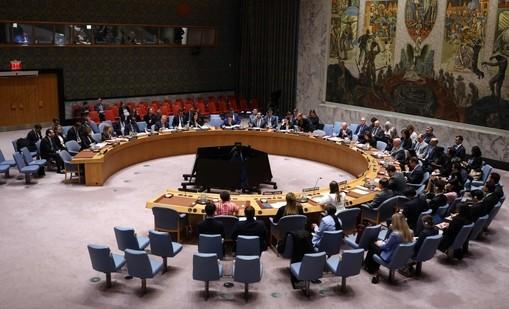
Title: Was LeT involved? UNSC asks Pak on J&K attack, refuses to accept ‘false flag’ claim
The United Nations Security Council (UNSC) has been embroiled in a controversy after it refused to accept Pakistan’s claim that the recent Pahalgam attack was a “false flag” operation. The UNSC members, during a closed-door meeting requested by Pakistan, instead questioned whether the terror outfit Lashkar-e-Taiba (LeT) based in Pakistan was likely to be involved in the attack.
The Pahalgam attack, which took place on October 11, resulted in the killing of three policemen and injured several others. Pakistan had immediately denied any involvement in the attack, claiming that it was a “false flag” operation orchestrated by India to defame Pakistan. However, the UNSC members were not convinced by Pakistan’s narrative and instead sought more information on the incident.
According to reports, some UNSC members brought up the targeting of tourists on the basis of religion, which raised suspicions about the involvement of LeT, a known terror outfit with links to Pakistan-based militant groups. LeT has been responsible for several terror attacks in India, including the 2008 Mumbai attacks that killed over 160 people.
The UNSC members’ skepticism about Pakistan’s claim was evident when they asked Pakistan to provide more evidence and details about the attack. Pakistan, however, remained adamant that the attack was a “false flag” operation and refused to provide any concrete evidence to support its claim.
The refusal of the UNSC members to accept Pakistan’s narrative has raised concerns about the country’s involvement in the attack. The attack took place in a tourist hotspot, and the targeting of tourists on the basis of religion has sparked widespread outrage and condemnation.
Pakistan’s claim that the attack was a “false flag” operation has been met with skepticism by many experts and analysts. They point out that Pakistan has a history of using proxy militant groups to carry out attacks in India and then denying any involvement.
The UNSC’s refusal to accept Pakistan’s claim is a significant development, as it suggests that the international community is not convinced by Pakistan’s narrative. The UNSC’s demand for more information and evidence from Pakistan also puts pressure on the country to provide concrete proof of its innocence.
The Pahalgam attack is just the latest in a series of attacks on Indian soil that have been attributed to Pakistan-based militant groups. The attack has once again raised concerns about Pakistan’s role in promoting terrorism in the region.
In recent years, Pakistan has been accused of using terrorist groups to carry out attacks in India, Afghanistan, and other parts of the region. The country’s military and intelligence agencies have been accused of providing support and funding to these groups.
The UNSC’s refusal to accept Pakistan’s claim is a significant setback for the country, which has been trying to deflect international attention away from its involvement in the attack. The country’s refusal to provide any concrete evidence or details about the attack has raised suspicions and has led many experts and analysts to question Pakistan’s innocence.
The Pahalgam attack is a stark reminder of the ongoing threat posed by terrorism in the region. The attack highlights the need for countries to work together to combat terrorism and prevent such attacks from happening in the future.
In conclusion, the UNSC’s refusal to accept Pakistan’s claim that the Pahalgam attack was a “false flag” operation is a significant development. The UNSC’s demand for more information and evidence from Pakistan puts pressure on the country to provide concrete proof of its innocence. The attack once again raises concerns about Pakistan’s role in promoting terrorism in the region and highlights the need for countries to work together to combat terrorism.



